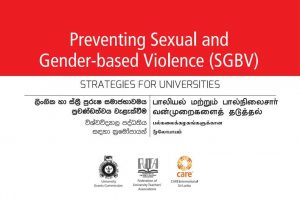SGBV The GEEC shall inter alia be empowered to formulate strategies and actions:
A. Disseminate information on GEE policies, SGBV and related grievance handling procedures to staff and students annually through awareness programme, interactive dialogue, brochures, handbooks and flyers in Tamil, Sinhala and English.
- Conducting awareness programme – during orientation / induction to students / staff by the Education and Research Committee of GEEC in association with Staff Development Centre
- Interactive dialogue – Faculty wise programme for staff and students conducted by each faculty with the consultation of GEEC
- Incorporating GEE and SGBV into the curriculum by the Faculty Curriculum Committee with the consultation of GEEC
- Brochures, handbooks and flyers – during registration of new entrants by Resource Mobilization and Education and Research Committees of GEEC
- Disseminate information about GEE policies and GEEC activities by posting / circulating relevant material through relevant channels to the university community by all sub-committees of GEEC
- Sensitize staff who deal with student welfare and discipline annually by all sub-committees of GEEC
- Design and implement a gender-responsive cross generational leadership and mentoring programme for all female staff – by the Education and Research Committee of GEEC in association with Staff Development Centre
B. Given that leadership from the Vice-Chancellor, Rector, Registrar, Bursar, Librarian, Deans, and Heads is required to implement the policy and to carry out the relevant measures effectively, the university shall endeavour to
- Provide necessary resources, infrastructure facilities and support for the smooth functioning of the GEEC
- Ensure GEE in recruitments / nominations wherever applicable o Committed to incorporate GEE and SGBV into the curriculum
- Committed to ensure zero tolerance towards SGBV o Ensure a secure environment that includes street and security lighting; posting security at strategic points; providing night surveillance services; availing hotlines for emergencies, etc. particular attention be paid to halls of residence
- Invest in child care facilities on university premises for the benefit of parenting staff
C. Create widespread awareness about the grievance mechanism to address complaints of SGBV
- Sensitize the university community about the policies and grievance mechanism by displaying the above in library, offices and online portal by Grievance Committee, Resource Mobilization and Education and Research Committees of GEEC
- Train volunteer groups of students to raise consciousness on SGBV and grievances among their peers by Resource Mobilization and Education and Research Committees of GEEC
D. Create awareness and capacity building and encourage staff and students towards the zero tolerance of SGBV within the university
E. Ensure that there is proportionate representation of male and female as office bearers in students’ or staff’s unions / associations / societies
- Bring amendments to the existing constitutions of students’ unions / associations / societies by the Vice Chancellor and the Council
- Encourage registered trade unions to amend their constitutions accordingly – by Education and Research Sub committee
- Sensitize about proportionate representation through the activities of GEEC–by Education and Research Sub committee
F. Create annual allocation for GEEC in the annual budget of the university based on the proposal submitted by the GEEC
- Prepare the annual budget proposal for GEEC activities – by Resource Mobilization Sub Committee
- Follow up and proceed the financial allocations and disbursements as per the university financial regulations – by Resource Mobilization Sub Committee
G. Provide institutional avenues for victims and offenders to meet trained counselors and deal with the root causes of SGBV issues
- Establish a counseling division at the university Health Centre
- Train student counselors to deal with SGBV victims and offenders
- Sensitize the university community to direct SGBV victims to appropriate authority
- Provide accessible helpline e. submit detailed report on root causes of SGBV and recommendations for prevention to the Vice Chancellor based on the report from the counseling division and trained student counselors – by Grievance Sub Committee
H. Compile a database of reported incidents of SGBV within the University
- Prepare a statistics report on SGBV data based on the report from the counseling division and trained student counselors and publish – by Grievance Sub Committee and Education and Research Sub Committee
I. Recommend the relevant authorities to review and update policies / forms / procedures on the use of gender inclusive languages and public display of visual aids and materials that are demeaning to men and women
- Create awareness among the university community – by Education and Research Sub Committee b. Monitor the updates in policies / forms / procedures – by Monitoring Committee
J. Adopt a gender-responsive research environment that improves our understanding of national development issues, and impacts positively on the lives of men and women
- Train the staff and students on gender-focused research skills – by Education and Research Sub-committee in association with Staff Development Centre
- Develop guidelines to ensure that research processes and innovations integrate gender analysis wherever applicable –by Education and Research Sub committee
- Recommend an affirmative action programme to encourage participation of female members of staff, with specific budget allocations to support their multiple roles in society – by Resource Mobilization and Education and Research Sub committees
- Create a research forum or an agenda in the existing research conferences in the university to facilitate the dissemination of gender focused research findings – by Education and Research Sub committee
K. Recognize and reward “champions” who are active in promoting gender equity/equality and eliminating SGBV a. Recommend name of one staff member annually to the Council for the award by the GEEC according to the criteria set out by the GEEC b. Recommend name of one student annually to the Council for the award by the GEEC according to the criteria set out by the GEEC

